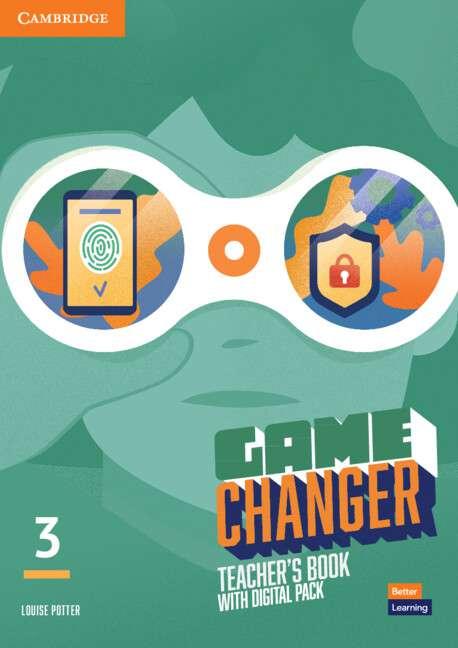

Cambridge University Press & Assessment 978-1-009-26781-6 Game Changer Level 3 Teacher's Book with Digital Pack Louise Potter Table of Contents More Information www.cambridge.org © in this web service Cambridge University Press & Assessment Introduction III Contents Welcome to Game Changer Key Features of Game Changer Game Changer and the Cambridge Life Competencies Framework Student’s Book and Workbook Visual Guide Digital Resource Pack Visual Guide Map of the Book Teacher’s Notes Welcome Unit Unit 1 My Life Plan Unit 2 What Makes Us Happy? Unit 3 Consumer World Unit 4 We Can Save Our Planet Unit 5 My Online Self Unit 6 The World of Music Unit 7 Africa: Past, Present, and Future Unit 8 What’s Important to Me? Extra Reading Puzzles Answer Key Projects Workbook Student’s Book Audio Script IV VI VII VIII XV XVI T4 T9 T19 T31 T41 T53 T63 T75 T85 T97 T101 T102 T106 T138
Potter
Lesson Aim: I can compare places, use gerunds, and talk about free-time activities. Welcome!

0.01 Audioscript pT138




























1 Greet students and welcome them to class. Say: Hello, I’m (your name). Nice to meet you. Encourage volunteers to introduce themselves in the same way. Talk about where you are from (city and neighborhood) and encourage students to do the same, using the comparative form. Invite students to look at the image of the city of Rio de Janeiro and ask them what they know about Rio. Have them compare Rio to their own city. Then have them complete the article using the correct comparative form.

2 Review the gerund form with students. Put students into pairs and ask them to complete the mini dialogues. Encourage peers to help each other. Check their work by eliciting the answers from volunteers.

3 0.01 Read the verbs together with the students. Invite them to look at the images and complete the phrases below, using the correct verb. Play the audio for students to check their work and the pronunciation of the phrases.
Extension
Have students write a small paragraph about their hometown. Have them use Exercise 1 as a reference.
1
COMPARATIVES
Complete
GERUNDS

2
Carnival celebrations in Brazil are 1 more exciting than (exciting) in any other country, and Rio de Janeiro is Brazil’s most popular destination with a lot of different neighborhoods to choose from. For example Ipanema is famous for its Carnival parties, but it’s 2 (crowded) Barra daTijuca, and Santa Tereza is 3 (traditional) both those neighborhoods – you’ll definitely enjoy an authentic “carioca” experience there!
In Rio you’ll want to have fun at the beach, too! Copacabana and Leblon are amazing, but beaches like Prainha, Reserva, and Grumari are often 4 (clean) and 5 (peaceful) those very popular beaches. After enjoying the Carnival, you can visit places not too far away from Rio. Petrópolis, Itaipava, and Penedo are a lot 6 (quiet) the state capital, and are great places to relax!
Complete the mini dialogues with the gerund form of the verbs below.
• add• avoid• drink • ride• take• wait
1 A Dr. Ramirez, what are some things people can do to keep healthy?

B Well, drinking enough water is very important. And sugar is a simple step. For example, more sugar to chocolate milk is totally unnecessary.
2 A I don’t like the bus to school.
B Why? It’s much faster than your bike.
A Yes, but I don’t like for the bus on my own at the bus stop.
FREE-TIME ACTIVITIES
3
0.01 Look at the images and complete with the words below. Then listen, check, and repeat.
• eat• go• play • watch
Cambridge University Press & Assessment
978-1-009-26781-6 Game Changer Level 3 Teacher's Book with Digital Pack
www.cambridge.org © in this web service Cambridge University Press & Assessment
Louise
Excerpt More Information
WELCOME!
the article with the comparative form of the adjectives in parentheses.
to a concert out play in a band series 3 2 1 4 Visit Rio de Janeiro 4 more crowded than more traditional than cleaner more peaceful than quieter than avoiding adding taking riding waiting eatgowatch
Welcome! | Starter T4
Cambridge University Press & Assessment





978-1-009-26781-6 Game Changer Level 3 Teacher's Book with Digital Pack
 Louise Potter
Louise Potter
Excerpt
More Information
0.02 Audioscript pT138




1 0.02 Review occupations with students. If you think students will be comfortable to do so, elicit their parents’ occupations and write them on the board as students call them out. Check to see which occupation is the most common amongst the class. Have students look at the images in their books and unscramble the words to match them. Play the audio to check their work. Focus on pronunciation by asking students to repeat the different occupations.
2 Review with students how we use the simple future using will. Ask some students for personal examples. Ask students to make up a sentence using will and share it with a peer. Have students read the sentences and complete them with the correct simple future form. Have them check their work in pairs.
3 Remind students how to ask questions using be going to Ask students simple questions, e.g.: Are you going to soccer practice tomorrow? What time are you going to bed tonight? How long are you going to spend on vacation? etc. Invite students to look at the prompts in their books and give them two minutes to form questions. Have them check their work in pairs.
USE IT!
4 Put students into pairs to practice asking and answering the questions from Exercise 3. Encourage them to come up with more questions to interview their partner. Monitor their work.
Extension
Have students write a small paragraph about which occupation they believe will be the most in demand in the future. Have them justify their answer. Encourage them to share their paragraphs.
Lesson Aim: : I can talk about occupations, use the simple future, and use be going to for intentions.


0.02 Put the letters below in the correct order and label the images. Then listen, check, and repeat. • ahsinof snedegir • camisuni • hefc • lheteta • nraced • regeenni •
SIMPLE FUTURE
Complete the sentences with the correct simple future form of the verbs in parentheses.
1 The inventor will explain (explain) his new project in the next class.
2 We can have a picnic at the park on Sunday. I’m sure it (not rain).

3 The students (donate) their old books to the local library.
4 My cell phone still works well, so I (not buy) a new one for the moment.
will donate won’t buy Will live



5 Julia (live) abroad like her sister?
Write questions using the prompts and the correct form of be going to 3
1 How long / you / stay at school today?
How long are you going to stay at school today?
2 you / do your homework immediately after class?
Are you going to do your homework immediately after class?
3 What time / you / get up tomorrow?
What time are you going to get up tomorrow?
4 What / you / do next vacation? Work
What are you going to do for your next vacation?
www.cambridge.org © in this web service Cambridge University Press & Assessment
• taorc
suern
1
2
OCCUPATIONS
in pairs.
3. 4 USE IT! I’m going to be here until 2 p.m. What about you? How long are you going to stay at school today? fashion designer 1 5 2 6 3 7 4 8
Take turns asking and answering the questions in Exercise
5 WELCOME actor engineerathlete musician nurse chef dancer won’t
BE GOING TO
rain
T5 Starter | Welcome!
Welcome!
Cambridge University Press & Assessment


978-1-009-26781-6 Game Changer Level 3 Teacher's Book with Digital Pack
Louise Potter
Excerpt
More Information
0.03 Audioscript pT138


1 0.03 Have students keep their books closed. Write the word weather on the board. Build a mind map with your students with all the words that come to their minds when they think of the word weather. Have them open their books and look at the images. Ask them to check if any of the images relate to the words on their mind map. Ask volunteers to read the words in the boxes above the images. Have them match the images to the six words from the first box. In pairs, have students read sentences 1–6 and complete the sentences with the words from the box. Draw their attention to the fact that image 1 and sentence 1 are linked and so on. Play the audio to check their work. Have them pay attention to pronunciation and intonation.
2 Review the present progressive tense with students. Ask them to give you examples. Ask them to read the sentences and complete the dialogue. Encourage students to give you more examples after completing the sentences.
LOOK!
Draw attention to the Look! box. Read the sentence with students and ask them to give you more examples. Remind them that we use the present progressive tense for ongoing activities, and also for future arrangements and intended actions.
3 Remind students how we make polite offers to people. Write the following on the board: the movies, a concert, a jog. Ask volunteers to invite their peers to the different events. Have students read the sentences 1–3. Individually, have them complete the sentences using the prompts.
4 Have students complete the sentences with their own ideas.
EXTREME WEATHER


1
0.03 Complete the sentences with a word from each box. Then listen and check.
• blizzard • flood• forest fire
• heatwave• hurricane• thunderstorm
• cold
• dry• hot
• incredible• terrible• wet
1 It was really cold here yesterday and a blizzard hit the city in the morning.
2 We arrived in Madrid during a . It was really in the afternoon.
3 A can start quickly in a summer with no rain, when the country is very


4 Because of the , everything downstairs in our house got
5 There was a big in Perth last night. Look at the photo my cousin took!
6 The caused problems for people living on the coast.


PRESENT PROGRESSIVE
Complete the dialogue with the correct present progressive form of the verbs in parentheses.
2 POLITE OFFERS
A My brother and his friend 1 are leaving (leave) for Australia next month.
B Wow! How long 2 they (stay) there?
A For six weeks. They 3 (come) back at the end of August.
B 4 your sister (work) in the mall tonight?
A No, she isn’t. She 5 (study) for a test.
LOOK!
We use the present progressive for future plans, appointments, and arrangements. Mariela is traveling to the UK next week. (She has her plane ticket and her hotel booking.)
3
Write questions to ask a friend using the prompts and the correct object pronoun.
1 There’s a new science fiction movie at Moviemark. (see?)
Would you like to see it?
2 My dad made these chocolate cookies. (try?)
Would you like to try them?
3 We’re playing video games at Isa’s house tonight. (join?)
Would you like to join us?
USE IT!
I’d
5
Work in pairs. Take turns saying your sentences in Exercise 4 and asking questions to find out more information.
USE IT!
5 Put students into pairs. Have them look at the speech bubbles and model the activity with a student. Student As should read their sentences to their partners. Student Bs should react by asking for more information. Then have them change roles.
What would you like to see?
Extension
Ask students to write a small dialogue regarding their plans for the weekend. Encourage them to write three or four sentences, using the present progressive, about a plan they intend to do. However, when they hear of a change in circumstances, for example, a bad weather forecast, they have to change their plan. For example:
A I’m going to travel to the beach next week.
B The weather forecast is very bad.
A Oh no! I will change my plans.
www.cambridge.org © in this web service Cambridge University Press & Assessment
1 2 3 4 5 6
like to go to the movies tonight. Complete the sentences with I’d like to or I’d love to and your own ideas.
go tonight.
meet one day. 4 6 heatwave forest fire flood thunderstorm hurricane are ’re/are coming ’s/is studying
1
2
Students’ own answers
terrible staying Isworking incredible wet dry hot
Welcome! | Starter T6
Lesson Aim: I can talk about extreme weather, use the present progressive, and make polite offers. Welcome!
Cambridge University Press & Assessment

978-1-009-26781-6 Game Changer Level 3 Teacher's Book with Digital Pack
Louise Potter
Excerpt
More Information
Lesson Aim: I can talk about shopping; I can use countable and uncountable nouns, intensifiers, and quantifiers. Welcome!
0.04 Audioscript pT138



1 0.04 Divide students into pairs. Write the word shopping on the board. Give them 30 seconds to write as many words related to the topic as they can. Check to see which pair was able to write the most words. Have them read the paragraph in their books and circle the correct option. Play the audio to check their work.
2 Write the words artist and money on the board. Have them classify whether the words are countable or uncountable. Have them justify their answer. Ask students to read the words in their books and complete the chart. Have them add some of their own words.
3 Write the following intensifiers on the board: really, extremely, quite. Ask volunteers to come up with sentences using these intensifiers, explaining the reason for intensifiers (adverbs that make another word stronger). Ask students to read sentences 1–6 and circle the correct option. In pairs, have them check their work and justify their choices.
4 Write how much and how many on the board. Ask students to give you examples of questions with each one, and explain the reason for using them. Individually, have students read questions 1–6 and complete them with the correct option. Have them come up with other examples related to their daily activities.
LOOK!
Draw attention to the Look! box. Explain to students that we use much for uncountable nouns (singular) and many for countable nouns (plural). Both can be used in interrogative and negative sentences, however, much is never used in affirmative sentences: I have much money. I have a lot of money. Ask them to give you more examples by transforming the questions in Exercise 4 into affirmative sentences.
SHOPPING
1
0.04 Circle the correct options. Then listen and check.
Olivia is at the 1shop / shopping / store mall. She’d like to buy a new jacket, but she can’t 2donate / earn / afford it. She 3saved / spent / borrowed almost all her 4pocket / customer / free money last weekend, and she can’t use her 5money / debit / bargain card because she doesn’t have enough 6money / bills / coins in the bank.
Complete the chart with the words below.
2
• artist • beauty• border• food
• information• juice• message
• money• price• review
INTENSIFIERS
3
Circle the correct options.
1 I put too much / too many sugar in my coffee.
2 Lucas is the most popular student I know. He has a lot of / enough friends.
3 The test was difficult. There were too much / too many questions to answer.
4 This closet is so small! There’s enough / not enough space for your clothes.
5 There’s not much / not many information about Carl’s accident. I hope he’s OK.
6 You don’t need to go to the market. We have enough / too many eggs for the cake.
QUANTIFIERS
4

Complete the sentences with How much or How many
1 How much homework did you do last night?
2 water do you drink every day?
3 students are there in your science class?
4 time do you need to get to school?
5 people live in your home?
6 subjects do you study?
USE IT!
Work in pairs. Take turns asking and answering the questions in Exercise 4.
5
USE IT!
5 Have students ask and answer the questions in Exercise 4. Monitor the activity by walking around the classroom.
LOOK!
In affirmative sentences, we use a lot of, not much There’s a lot of food in the fridge. I have a lot of homework to do.
Invite students to put together a “potluck” party (a party where each guest or group contributes a different, often homemade, dish of food to be shared during the event) for the class. In pairs, have them make a list of all the food and drink they will need. Then, have them interview each other regarding how much of each item they will need, and encourage them to write the quantities beside each item. Monitor the activity by walking around the class.
www.cambridge.org © in this web service Cambridge University Press & Assessment
artist COUNTABLE AND UNCOUNTABLE NOUNS 7 WELCOME border food beauty price How much How much How many How many How many juice messageinformation review money Extension
CountableUncountable
Starter | Welcome! T7
Cambridge University Press & Assessment



978-1-009-26781-6
Louise Potter
Excerpt
More Information
Game Changer Level 3 Teacher's Book with Digital Pack
Lesson Aim: I can talk about festivals and celebrations; I can use defining relative clauses and adverbs of manner.

0.05 Audioscripts pT138
1 0.05 Invite students to look at the images and draw students’ attention to the words above them. Invite students to try and match the images to the words. Invite a volunteer to read the sentences 1–6. Draw their attention to the fact that image 1 and sentence 1 are linked and so on. Individually, have students complete the sentences with the words above the images. Play the audio to check their work. Have students pay attention to pronunciation and intonation.
2 Remind students of defining and non-defining relative clauses. Explain to students that we use non-defining relative clauses to give extra information about the person or thing that is not necessarily important. Have students do the first one orally to check understanding of the task. Then have students work individually, rewriting the sentences using a non-defining relative clause. Have them check their work in pairs.
3 Read through the sentences 1–5 with the students and have them complete the sentences individually.
USE IT!
4 Have students write the list of adverbs from Exercise 3 in their notebooks. Model the activity for the students beforehand. Pair up students and have them write down three sentences (two true sentences and one false) using the listed adverbs. Have them take turns saying them to their partner and guessing the false sentence.
Extension
Individually, have students observe their classmates and what they are doing at this exact moment. Have them use the adverbs from their list in Exercise 3 and a non-defining relative clause to describe something a classmate is doing, e.g.: Paula, who is an excellent student, is working hard on her essay. Tell them they can also use different adverbs and make up situations, if necessary.
FESTIVALS AND CELEBRATIONS
0.05 Complete the sentences with the words below. Then listen and check.
• atmosphere• crowds• dance shows• fireworks• music events• souvenirs
2 3 4 5 6
1 Many tourists like to buy souvenirs at street markets.
3
2 Everyone danced and laughed a lot at Grandma’s party. The was great!

atmosphere

3 of people enjoy the Carnival at Copacabana.

Crowds dance shows
4 Women wear traditional dresses in in India.

Fireworks

5 are a popular way to celebrate the New Year all over the world.
6 According to the reviews, PopParty Fest was one of the best of the year.

DEFINING AND NON-DEFINING RELATIVE CLAUSES
Write one sentence with a non-defining relative clause using the two sentences and who or which
1 I watched the game with Bruna. Bruna is a big soccer fan.
2 The Paragon is closed this week. The Paragon is our favorite café.
music events closed this week, is our favorite café.
3 Hiro lives in Portugal now. Hiro is Japanese.
4 Last month I joined the drama club. The drama club meets every Tuesday at 2 p.m.
I watched the game with Bruna, who is a big soccer fan. The Paragon, which is our favorite café, is closed this week. / The Paragon, which is Hiro, who is Japanese, lives in Portugal now. / Hiro, who lives in Portugal now, is Japanese. Last month I joined the drama club, which meets every Tuesday at 2 p.m.
ADVERBS OF MANNER
Complete the sentences with adverbs from the adjectives in parentheses.
1 Sophia walked carefully (careful) around the gift store because she didn’t want to break anything.
2 Isabela is a fantastic role model because she studies (hard).
3 Mrs. Silva was driving too (fast) in the snowy weather.
4 The teacher told us to think (creative) to solve the math problem.
5 Santiago doesn’t play volleyball very (good) but he’s a wonderful coach.
USE IT!
I think that’s true.
4
I always ride my bike very carefully. 8
Work in pairs. Think of two true sentences and one false sentence about you using the adverbs in Exercise 3. Take turns saying your sentences and guess which of your partner’s sentences is false.
www.cambridge.org © in this web service Cambridge University Press & Assessment
2
1
1
hard fast creatively well
Welcome! | Starter T8
Welcome!
Cambridge University Press & Assessment





978-1-009-26781-6 Game Changer Level 3 Teacher's Book with Digital Pack
Louise Potter
Excerpt
More Information
Unit 1 My Life Plan
Warmer
Lesson Aim: I can talk about my different life stages and identify the importance of learning English within these phases.
Encourage students to say a couple of sentences about why they believe learning English is important. Ask them where they use the English language nowadays and where they believe they will use it in the future.
THINK!
1 Invite students to look at the image. Use a thinking routine from Harvard Graduate School of Education: See, Think, Wonder to reflect more deeply about this image. Ask: What do you see? What do you think about it? What does it make you wonder? Use this routine at the opening of every unit to help students observe and share their ideas regarding the image(s).
2 Invite them to share other situations in which knowing how to speak English is necessary. Have them justify their answers.
Amazing People
Summary

The video is about all the amazing things that have happened in the past centuries in science, technology, literature, arts, and many other contexts.
In Class
Ask students to list, in pairs, three amazing things they believe mankind has achieved. Have them share their list before watching the video.
Exercise 1
Ask students to watch the video to answer the questions:
1 Say three things in the video that are amazing. Check the answer with the class. going to the moon; building pyramids, towers, and bridges; creating paintings, music, and literature; inventing medicines, surgery, and the Internet; learning to walk or use language; being good at sports, art, and science; making people laugh or feel happy
2 Which invention helped us to connect the whole world? Check the answer with the class. The Internet
Exercise 2
Play the video again and have students answer the following questions. Then, ask them to watch the video again, check their answers, and make up two more questions to ask their partners.
Resources
● Teacher’s worksheets Unit 1
● Test Generator Unit 1



● Practice Extra Unit 1
● Workbook pages 112–115
● Puzzles and Games page 102
Flipped Classroom
Ask: Is college important? Should you do volunteer work? Do we all need to get married? Have them share their list digitally on a collaborative panel. If possible, invite them to watch the animated short movie, A Single Life (you can watch this film for free online). Ask them to note down the different stages in our life and the objects that represent each stage in the movie.
1 List some amazing structures built by man. Can you name one?
Pyramids, towers, and bridges. The Eiffel Tower in Paris.
2 According to the video, only scientists, inventors, and artists do amazing things.

( ) True ( ) False

Justify your answer.
We all do amazing things. We learn to walk and to use languages.

3 List some amazing things you can do.
Students’ own answers.
At Home
Exercise 3
Ask students to research an amazing invention they believe changed the world. Have them write a brief description of this invention and how it changed the world. Have them post their description on a collaborative platform so all students can access it.
Unit Aims




Cambridge Life Competencies Framework
I can ...
● use simple techniques to start, maintain, and close conversations of various lengths to talk about my future plans. (Communication)
● present points clearly and persuasively about my life. (Communication)
● start and manage conversations about my life stages with confidence. (Communication)

● understand essential grammatical terms and concepts: Use of reflexive pronouns and future tenses. (Learning to Learn)
● use strategies and techniques for improving my English (e.g., mind maps to organize thoughts). (Learning to Learn)
● understand various aspects of society when discussing indigenous languages. (Social Responsibility)
● find sources of information and help (online and in school) to enhance my understanding of English. (Learning to Learn)
www.cambridge.org © in this web service Cambridge University Press & Assessment 1.1 1 VIDEO 1 Say three things in the video that are amazing. 2 Which invention helped us to connect the whole world? THINK! 1 What do you think is happening in the image? 2 Is learning English important for situations like the one in the image? Why / Why not? PLAN UNIT GOALS • Talk about life stages and studying. • Read a blog about studying English abroad. • Listen to a video class giving tips for studying. • Learn about saving indigenous languages. • Express certainty and uncertainty. MY LIFE 9
1.1 Unit 1 | My Life Plan T9
Cambridge University Press & Assessment


978-1-009-26781-6 Game Changer Level 3 Teacher's Book with Digital Pack


Louise Potter
Excerpt More Information
Unit 1
My Life Plan
Warmer
Divide students into pairs and invite them to say which stage of life they believe is the happiest. Ask them to justify their answers.

Flipped Classroom Check


Invite students to share their lists of important things to do in life (have them rank them in order of importance) and the different stages of our life. Have them share the objects from the video that represent each stage. If the lists were created digitally, project them for students to see and have them discuss the items.
1.01 Audioscript pT138 Target Vocabulary



finish school /ˈfɪn.ɪʃ.skul/ get a job /ɡet.ə.dʒɑb/ get married /ɡet.ˈmær.id/ go to college /ɡoʊ.tə.ˈkɑl.ɪdʒ/ graduate /ˈɡrædʒ.u.ɪt/ have children /hæv.ˈtʃɪl.drən/ leave home /liv.hoʊm/ retire /rɪˈtɑɪər/ take a course /teɪk.ə.kɔrs/ take an exam /teɪk.ən.ɪɡˈzæm/


1 1.01 Have students read through the questions and ask them what sort of text they are looking at (a quiz). Ask them if they enjoy quizzes, and which question topics they like to answer. Draw students’ attention to the words/phrases in bold and compare them to their list of important things they want to do in life. Then have students match the words and phrases to the images. Invite them to listen to the audio to check theiranswers.
Vocabulary in Context
LessonAim: I can talk about my future life plans.
IN
LIFE STAGES
1.01 Read the quiz and match the words and phrases in bold with images 1–10. Then listen, check, and repeat.
Whatisthemost importantthingin yourlifeplan toDothequiz findout.




A Will you go to college when you finish school?

No way. I’ll get a job and earn my own money.
Yes, of course. I want to keep studying to learn more about the world.
I’m not sure. Maybe I’ll take acourse to get more practical skills.
B Which option best describes you?
To be happy I need to be able to help in my community. I’ll never retire – I want to work for the rest of my life.
When I’m an adult, I want to get married and have children
C For you, what’s the most important thing about learning English?
It helps me make new friends.
When I takean exam in English, I want to get a good score.
It connects me with other people around the world.
D What worries you the most when you think about the future?
Not finding a job after I graduate Being alone when I leave home Pollution and climate change.
graduatetake an exam
have children
www.cambridge.org © in this web service Cambridge University Press & Assessment
1 VOCABULARY
CONTEXT 1 6 2 7 3 8 4 9 5 10 finish school
?
10 get a job
leave home get married go to college
take a course
retire
My Life Plan | Unit 1 T10
Cambridge University Press & Assessment



978-1-009-26781-6 Game Changer Level 3 Teacher's Book with Digital Pack
Louise Potter
Excerpt
More Information
Unit 1
My Life Plan
2 Invite students to answer the quiz. Have them check their score and ask them whether they agree with the results. Have them justify their answer.
3 Ask students to look at the chart and the headings in each column. Have them classify the words and phrases above the chart in the correct columns. Have them add any other words or phrases from their own list of important things to do in life.
4 Have a volunteer read through the sentences. Individually, ask students to complete the sentences using the words and phrases from Exercise 3.
LOOK!
Draw attention to the Look! box. Ask for a volunteer to read the content of the box. Have students give more examples. Some students use the verb in the future tense in a clause with the words when, before, or after: When I will get a job, I will have more money. When I get a job, I will have more money.
USE IT!
5 Have students read the example questions and replace the phrases in bold with the words and phrases from Exercise 3, or from their own list. Model the activity using the examples given and a volunteer. Monitor their work by walking around the class.
Homework
Workbook page 113, Exercises 1 and 2
Practice Extra
Unit 1
Fast Finishers
Puzzles and Games page 102, Exercises 1 and 2
Vocabulary in Context
Lesson Aim: I can talk about my future life plans.
2
Do the quiz and check (✓) your answers. Then look at your score below and discuss it with a partner. Do you agree with your results? Why? / Why not?
Mostofyour answersare… Themostimportant thinginyourlife planis…


WORK people the world
You’re hard-working and always busy! You’ll be successful, but never forget that the people around you are very important, too.
You’re a sociable person and you love to be around people. That’s great, but remember: there’s a big world out there, too!
You think big and have great plans, but try to also find time for your private life. It’s important to have some fun!
Complete the chart with the words and phrases below.
• finish school•
4
Complete the sentences so they are true for you. Use words and phrases from Exercise 3.
1 I’m going to before I leave home.
2 I think I’ll be busy when I
3 I’m going to after I
4 I don’t think I’ll
5 I’m not going to before I’m 35.
6 When I , I’ll be really happy.
USE IT!
5
LOOK!
After when, before, and after to talk about the future, use the simple present, not will When I get a job,I’ll save some money.
Work in pairs. Take turns asking and answering about your future. Replace the phrases in bold with the correct form of other words and phrases from Exercise 3.
Extension
Ask students to interview an older family member. Have students build a timeline and then write a brief biography of their family member’s life up to this moment with all the different stages they have gone through. Encourage students to ask about and take note of the most important facts of each stage. Then, ask them to identify the happiest, saddest, and most complicated stages.
www.cambridge.org © in this web service Cambridge University Press & Assessment
I do. I
to
a
I’m not sure.
Yes,
want
take
course.
What do
to
Do you want to
married
Do you think going to college is important?
you want
do after you finish school?
get
? WORKBOOK p.113 PRACTICE EXTRA
get a job • get married• go to college• graduate • have children• leave home• retire• take a course• take an exam WorkEducationFamily get a job 3 11 UNIT 1 retirego to college finish school have children get married take a course graduateleave home take an exam Students’ own answers
Unit 1 | My Life Plan T11
978-1-009-26781-6 Game Changer Level 3 Teacher's Book with Digital Pack
Louise Potter
Unit 1 My Life Plan
Warmer
Write exchange student on the board. Ask students whether they would like to take part in an exchange program. In pairs, have them list the places they would like to visit and the languages they would like to learn in this sort of program.
1.02 Audioscript pT138






1 Draw students’ attention to the text and ask them where this kind of text can be found and encourage them to justify their answers. Have a volunteer read through sentences 1–4 to check understanding. Then have students skim the text in order to circle the sentences that are true.
2 1.02 Give students two minutes to read the text again. Individually, have them read questions 1–6 and identify the corresponding person (or B for both). Have them listen to the audio to check their answers.
3 Have students read the sentences individually and circle the correct option. Have them compare their answers in pairs.
THINK!
Have students sit in pairs. Give them one minute to make a list of all the English-speaking countries they can think of. Have them compare their lists. Write the places from the Think! box on the board and ask students if these places are on their list. Have them discuss the question in pairs. Encourage students to research on the Internet the reason why English has become a global language.
Homework
Workbook page 115, Exercises 1, 2, and 3
Reading Lesson Aim: I can read and understand blog posts about studying English abroad.
READING
Learn&Live English
Let's welcome our new students Verónica González and Daniel Ribeiro!
Expectations
Why Malta?
Verónica, 14 From: Mexico video games and sports

Some years ago I saw a video about the Maltese coast and I loved it! When I learned that English is one of the two official languages in Malta, I thought, “I want to study English there.”
Why South Africa?
Most people speak English and Maltese here. I can’t speak Maltese, but I can read the street signs – because they use English, too!
I think I’ll have a great time here in Malta. I’m going to take a four-week English course. Later, who knows? Will this experience help me get a job in the future?
Maybe. I’d love to become a game developer, so maybe I’ll make games about Malta!
Expectations
ABOUT US
We offer a variety of English courses for teenagers (12–17) in different countries.
Daniel, 15 From: Brazil languages and big animals

My parents wanted me to study English abroad before I go to college, and my dream is to go on a safari, so we decided that South Africa seemed like the perfect place.
I found out that there are over ten official languages in South Africa. English is one of them and most people actually speak English as a second language here.
Read the text quickly and circle the sentences that are true.
1 The text is a magazine article about English courses in different countries.
2 There are three blog posts on the page.
I’m very excited about this course. We’re not going to sit in a classroom all day. Tomorrow our instructors are going to take us to a local village. We’re going to help build a school there. How cool is that?
3 The people in the images are going to start an English course.
4 This website is for teenagers who want to study English abroad.



1.02 Read and listen to the text. Then answer the questions. Write V (Verónica), D (Daniel), or B (both).
Who …

1 likes wild animals? D
2 is in a country where English is one of the official languages?
3 is going to take a course that lasts for a month?
4 is going to do some community work as part of the course?
5 chose the country after talking to family members?
6 hopes that the experience abroad will be useful in the future?
Look at the words in bold in the blog post and circle the correct options in sentences 1–5.
Verónica 1 “Maltese” refers to a language spoken in / person from Malta.
Daniel
2 The word “they” refers to people from / street signsin Malta.
3 The word “over” means more than / on top of
4 The word “them” refers to official languages in / people from South Africa.
5 It is possible to replace “actually” with at the moment / in fact
THINK!
All of them
How many of these countries have English as an official language: Australia, Bahamas, Guyana, Ireland, Pakistan, Singapore, Uganda? Why do you think English is an official language in so many countries?
WORKBOOK p.115
Cambridge University Press & Assessment
www.cambridge.org © in this web service Cambridge University Press & Assessment
Excerpt More Information
1 2 3
CONTACT
12 HOME | OUR COURSES | DESTINATIONS | STUDENT LIFE | BLOG |
US
B V
D D V
My Life Plan | Unit 1 T12
Cambridge University Press & Assessment






978-1-009-26781-6 Game Changer Level 3 Teacher's Book with Digital Pack


Louise Potter
Excerpt
More Information
Unit 1 My Life Plan
1 If necessary, have students look at the blog posts on page 12 again to help them complete the chart. Encourage them to notice and analyze the differences between will and be going to Have them read the sentences in the chart and justify the use of each verb. When finished, ask them to work in pairs and give examples that are true for them. Have them write down two sentences each, using both forms.
2 Have students work individually and reorder the sentences. Have volunteers read out their answers for correction. Have students then scramble the sentences they wrote in Exercise 1 and hand them to a peer to reorder.
LOOK!
Draw student’s attention to the Look! box. Encourage them to build sentences that are true for them using I believe, I (don’t) think, I’m sure, maybe, perhaps, probably Invite them to share their sentences and react to their peers’ sentences, using Yes, I agree. No, I don’t think so. etc.
3 Have students read sentences 1–6 and pay attention to the plus and minus signs at the end of sentences 1–4. Have them check Daniel’s weekly planner and use be going to to complete the sentences. Have students check their work in pairs.
USE IT!
4 Model the activity using an example of your own. Individually, have students complete the sentences. Draw attention to the plus and minus sign at the end of each sentence.
5 Put students into pairs and have them read their sentences to each other. Encourage them to react back by making meaningful comments.
Language in Context
Lesson Aims: I can understand and use will for predictions, and be going to for intentions.
LANGUAGE IN CONTEXT
Look at the examples below. Complete the sentences from the blog post.
Be going to for Intentions
Will for Predictions
Affirmative (+)
I think I 1 a great time here in Malta. I’m sure this course will teach Verónica a lot.
’ll have are going to ’re not going to sit
Our instructors 3 us to a village. He’s going to help build a house. Negative (–) The classes won’t be boring. She probably won’t want to leave Malta! We 4 in a classroom all day. Bill is not going to spend the summer here.
Questions (?) 2 this experience me get a job? When are you going toleave South Africa?
Put the words in the correct order.
1 probably / I’ll / a / children / lot / have / of I’ll probably have a lot of children.
2 think / next / graduate / I / will / my / year / cousin
3 to / are / retire / my / going / soon / grandparents
4 you’ll / better / maybe / tomorrow / feel
5 next Monday / we’re / have / going / not / to / classes
I think my cousin will graduate next year. My grandparents are going to retire soon. Maybe you’ll feel be er tomorrow. We’re not going to have classes next Monday.
LOOK!
We often use will with I believe, I (don’t) think, I’m sure, maybe, perhaps, probably Maybe one day I’ll visit Malta.
Look at Daniel’s diary for next week. Complete the sentences with the correct form of be going to.
MondayTuesdayWednesdayThursdayFridaySaturday & Sunday
classes until 12:30 11:15 go bird watching
classes until 12:30 go bike riding Sports Day
classes until 12:30 goswimming
1 Daniel is going to play sports on Wednesday. (+)
classes until 12:30 go on safaria
go on a safari visit Cape Town
are going to go swimming
2 The students on Thursday afternoon. (+)
3 Daniel after 11:15 on Tuesday. (–)



4 In a message to his parents, Daniel wrote, “I on Tuesday afternoon.” (+)










5 Daniel and his friends on Saturday? No, they’re not.
Is Are



6 Daniel four days next week? Yes, he is.
is not going to have classes ’m going to go bird watching going to go on a safari going to have classes
4 5
USE IT!
Complete the sentences with the correct forms of be going to so they are true for you.
Students’ own answers

1 When I leave home, . (+)
2 One thing about my life in the future: I . (–) Work in pairs. Take turns reading your sentences and making comments.
That’s great! You’ll have a lot of fun!
Grammar Game
In pairs, have students decide where they want to go to do an exchange program. Have them build an itinerary and make plans using be going to. Have them then write what they think the experiences will be like using will, e.g., We’re going to stay in a university dorm. I think it will be fun! Having finished, have two pairs interview each other about their plans
A Where are we going on our exchange program?
B Let’s go to Granada.
A Wow! Where are we going to stay?
B Let’s look for a university dorm. I think that will be fun!
A OK … how long are we going to stay?
B 6 months?
A I will miss my family.
Homework
Workbook page 114, Exercises 1 and 2
Practice Extra Unit 1
www.cambridge.org © in this web service Cambridge University Press & Assessment
1 2 3
weekly planner
p.112 and 114 PRACTICE EXTRA 13 UNIT 1
WORKBOOK
Will help take
Unit 1 | My Life Plan T13



































 Louise Potter
Louise Potter


















































































